If We Slip on Funding We’re Toast
We get no margin for error on these donation drives. Zero. Every fundraising appeal, every donation matters.
It’s a shame that raising what little we need absorbs so much of energy. That’s not right.
Pitch in a bit. It absolutely matters.
Marc Ash
Founder, Reader Supported News
If you would prefer to send a check:
Reader Supported News
PO Box 2043 / Citrus Heights, CA 95611
Follow us on facebook and twitter!
Live on the homepage now!
Reader Supported News
Sarah Bloom Raskin's candidacy for the Fed may be dead in the water.
Raskin's stance on environmental issues, including her view on the transition away from fossil fuels, are colliding with soaring gas prices and a renewed debate about oil independence in the face of the Russia-Ukraine conflict. "Her previous public statements have failed to satisfactorily address my concerns about the critical importance of financing an all-of-the-above energy policy to meet our nation's critical energy needs," Manchin said in a statement on Monday announcing his opposition to Raskin's nomination. Manchin is not a member of the Senate Banking Committee that will be voting on Raskin's candidacy.
Maintaining a certain amount of consistency, Manchin’s opposition contributes to a general Republican stonewall. The GOP members of the Senate Banking Committee boycotted a hearing on Raskin’s nomination. They've also stalled two other Biden nominees to the board, as well as the renomination of Jerome Powell for another term as Fed chair. From the Washington Post:
Sen. Patrick J. Toomey (R-Pa.) and other GOP lawmakers have attacked her view that the Fed should do more to mitigate the financial risks of climate change, including by potentially changing the way it regulates energy producers. Manchin — who represents West Virginia and its high concentration of energy jobs — is adding his high-profile voice to those warning the Fed against tackling climate issues.
First of all, Toomey’s “high-profile voice” ought to be audible only to dogs since he’s retiring anyway. But, assuming his ideas carry the day, it will be the latest indication that the institutions of our government are unwilling and/or incapable of coping with the onrushing magnitude of the climate crisis. Of course, Joe Manchin is also an indication.
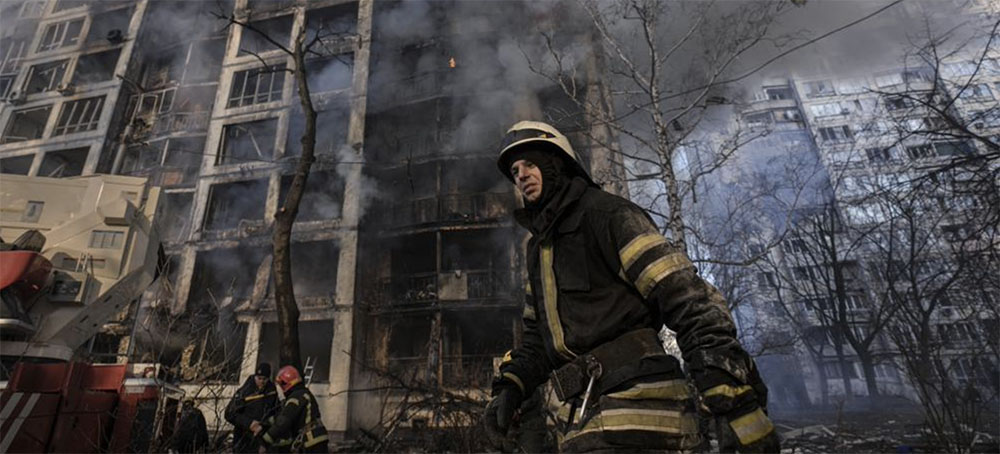 A firefighter walks outside a destroyed apartment building after a bombing in a residential area in Kyiv, Ukraine, Tuesday, March 15, 2022. Russia's offensive in Ukraine has edged closer to central Kyiv with a series of strikes hitting a residential neighborhood as the leaders of three European Union member countries planned a visit to Ukraine's embattled capital. (photo: Vadim Ghirda/AP)
A firefighter walks outside a destroyed apartment building after a bombing in a residential area in Kyiv, Ukraine, Tuesday, March 15, 2022. Russia's offensive in Ukraine has edged closer to central Kyiv with a series of strikes hitting a residential neighborhood as the leaders of three European Union member countries planned a visit to Ukraine's embattled capital. (photo: Vadim Ghirda/AP)
On the diplomatic front, another round of talks began between Russia and Ukraine via video, and the leaders of three European Union countries — including Poland, a NATO member on Ukraine’s doorstep — planned a visit to the embattled capital in a bold show of support.
With the number of people driven from the country by the war eclipsing 3 million, l arge explosions thundered across Kyiv before dawn from what Ukrainian authorities said were artillery strikes, as Russia’s assault on the capital appeared to become more systematic and edged closer to the city center.
Ukrainian President Volodymyr Zelenskyy said barrages hit four multi-story buildings in the city and killed dozens of people. The shelling ignited a huge fire in a 15-story apartment building and spurred a frantic rescue effort.
The strikes, carried out of the 20th day of Russia’s invasion, targeted a western district of Kyiv, disrupting a relative calm that returned after an initial advance by Moscow’s forces was stopped in the early days of the war.
The U.N. said close to 700 civilians in Ukraine have been confirmed killed, with the true figure probably much higher.
Fox News video journalist Pierre Zakrzewski was killed when the vehicle he was traveling in was hit by fire Monday on the outskirts of Kyiv, the network said. He was the second journalist killed in Ukraine in two days.
The leaders of Poland, the Czech Republic and Slovenia set out for Kyiv by train despite the security risks, in a visit EU officials said was not sanctioned by other members of the 27-nation bloc.
“The aim of the visit is to express the European Union’s unequivocal support for Ukraine and its freedom and independence,” Czech Prime Minister Petr Fiala said in a tweet. He was joined by fellow Prime Ministers Janez Jansa of Slovenia and Mateusz Morawiecki of Poland, as well as Jaroslaw Kaczynski, Poland’s de facto leader.
New efforts to bring civilians to safety and deliver aid were underway around the country. The Red Cross said it was working to evacuate people from the northeastern town of Sumy near the Russian border in about 70 buses.
One of the most desperate situations is in Mariupol, the southern city of 430,000 where officials say a weekslong siege has killed more than 2,300 people and left residents struggling for food, water, heat and medicine.
The Mariupol city council reported that 2,000 civilian cars had managed to leave along a humanitarian corridor that runs for more than 260 kilometers (160 miles) west to the city of Zaporizhzhia. Another 2,000 cars were waiting to leave along the route, the council said.
As for the latest round of talks, Ukrainian presidential aide Mykhailo Podolyak said they were discussing a cease-fire and Russian troop withdrawal. Russian Foreign Minister Sergey Lavrov said Moscow would press its demands that Ukraine drop its bid to join NATO, adopt a neutral status and “demilitarize.”
Zelenskyy told European leaders gathered in London that his country realizes it can’t join NATO.
“We have heard for many years about the open doors, but we also heard that we can’t enter those doors,” he said. “This is the truth, and we have simply to accept it as it is.”
When Russia launched the war three weeks ago, fear of an imminent invasion gripped the Ukrainian capital, and residents slept in subway stations or crammed onto trains to flee. But as the Russian offensive bogged down, Kyiv saw a relative lull. U.S. officials said Russian forces were about 15 kilometers (9 miles) from the center of the city as of Monday.
Fighting has intensified on Kyiv’s outskirts in recent days, and air raid sirens wailed inside the capital. Mayor Vitali Klitschko announced a 35-hour curfew extending through Thursday morning.
Tuesday’s artillery strikes hit the Svyatoshynskyi district of western Kyiv, adjacent to the suburb of Irpin, which has seen some of the worst fighting of the war.
Flames shot out of the 15-story apartment building and smoke choked the air as firefighters climbed ladders to rescue people. The assault blackened several floors of the building, ripped a hole in the ground outside and blew out windows in neighboring apartment blocks. Rescue workers said at least one person was killed.
“Yesterday we extinguished one fire, today another. It is very difficult,” a firefighter who gave only his first name, Andriy, said outside the building, tears falling from his eyes. “People are dying, and the worst thing is that children are dying. They haven’t lived their lives and they have already seen this.”
Resident Volodymr Trophimov said he watched as a building was hit. “And then there was a howl, and I watched out of the window, and it crashed into the building and all the windows were smashed,” he said.
Shockwaves from an explosion also damaged the entry to a downtown subway station that has been used as a bomb shelter. City authorities tweeted an image of the blown-out facade and said trains would no longer stop at the station.
A 10-story apartment building in the Podilsky district of Kyiv, north of the government quarter, was damaged. Russian forces also stepped up strikes overnight on Irpin and the northwest Kyiv suburbs of Hostomel and Bucha, said the head of the capital region, Oleksiy Kuleba.
“Many streets have been turned into a mush of steel and concrete. People have been hiding for weeks in basements, and are afraid to go out even for evacuations,” Kuleba said on Ukrainian television.
In the country’s east, Russian forces launched more than 60 strikes overnight on Ukraine’s second-largest city, Kharkiv, according to regional administration chief Oleh Sinehubov. The strikes hit the city’s historical center, including the main marketplace.
Sinehubov said fires were raging and rescuers pulled dozens of bodies of civilian from the ruins of destroyed apartment buildings.
Ukraine’s parliament voted to extend martial law for another month, until April 24. Under the measure, requested by Zelenskyy, men between 18 and 60 are barred from leaving the country so they can be called up to fight.
In Mykolaiv, a strategic southern city near the Black Sea where airstrikes killed nine people Sunday, residents braced for more attacks. Volunteers prepared food and sorted donated clothes at an abandoned naval yard that was turned into a support center for troops. Molotov cocktails were on hand to take on invaders.
“We are bombed during the day and during the night,” said Svetlana Gryshchenko, whose soldier son was killed in the fighting. “It’s a nightmare what Russia is doing on the territory of Ukraine.”
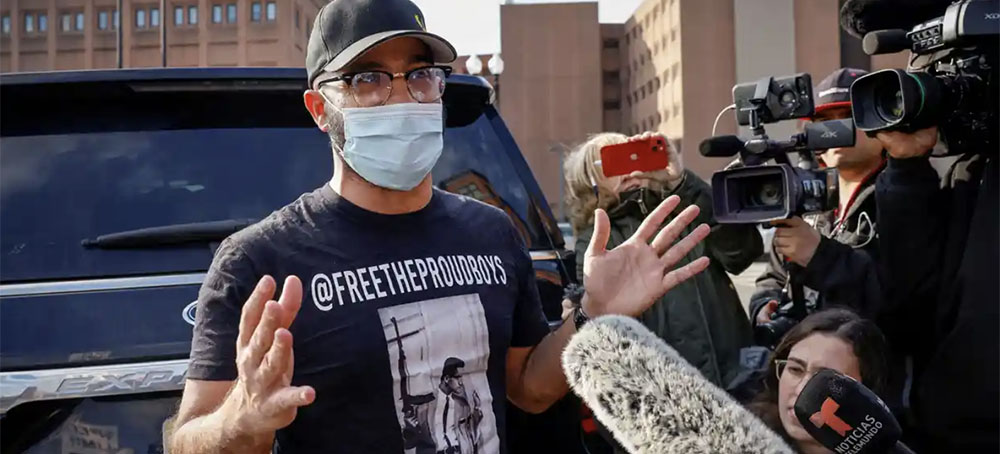 Proud Boys leader Enrique Tarrio speaks to the media following his release from jail in Washington, on 14 January. (photo: Evelyn Hockstein/Reuters)
Proud Boys leader Enrique Tarrio speaks to the media following his release from jail in Washington, on 14 January. (photo: Evelyn Hockstein/Reuters)
Enrique Tarrio possessed document titled ‘1776 Returns’, with details to invade and occupy seven buildings, New York Times says
Enrique Tarrio, the group’s former chairman who was arrested last week and charged with conspiracy over the deadly attack, had a nine-page document entitled “1776 Returns”, named for the year of American independence, the New York Times reported.
The document, mentioned only in general terms in Tarrio’s indictment, contained details of a complex plan for supporters of Donald Trump to invade and occupy at least seven House and Senate office buildings on the afternoon Congress met to certify Joe Biden’s election victory, according to Times sources.
Trump has promoted the lie that the election was stolen and incited the attack on Congress as part of a wider effort to have the result overturned.
The document features five sections, the Times reported: infiltrate, execution, distract, occupy and sit-in. The plan called for the recruiting of at least 50 Proud Boys and other Trump supporters to enter and occupy each building, “causing trouble” for security personnel who tried to stop them.
Once inside, the instructions stated, the activists would be encouraged to chant slogans such as “We the People” and “No Trump, no America”. Supporters unable to gain access to the buildings would be encouraged to distract law enforcement and other authorities by “pulling fire alarms at nearby stores, hotels and museums”.
In the days before 6 January, Proud Boys were to undertake reconnaissance of roads near the seven buildings, looking out for roadblocks and other obstacles.
Questions remain over the origin of the document and whether Tarrio, 38, shared it with any of the individuals charged alongside him.
They are Ethan Nordean, 31, of Auburn, Washington; Joseph Biggs, 38, of Ormond Beach, Florida; Zachary Rehl, 36, of Philadelphia; Charles Donohoe, 34, of Kernersville, North Carolina; and Dominic Pezzola, 44, of Rochester, New York.
But its existence lends context to the US justice department’s decision to charge Tarrio with conspiracy, even though he was not in Washington on the day of the riot.
According to the indictment, Tarrio “nonetheless continued to direct and encourage the Proud Boys prior to and during the events of 6 January 2021” and later “claimed credit for what had happened on social media and in an encrypted chat room during and after the attack”.
Tarrio has denied involvement in planning the riot. His lawyer, Nayib Hassan, declined comment to the Times.
More than 770 people have been charged in connection with the Capitol riot, at least 30 members of the Proud Boys, court records show.
Tarrio, from Miami, recently stood down as chair of the group, after being sentenced last year to five months in prison for burning a Black Lives Matter banner and unlawfully bringing weapons to a Washington protest.
He was also exposed last year as a long-time informant for the FBI and local law enforcement agencies.
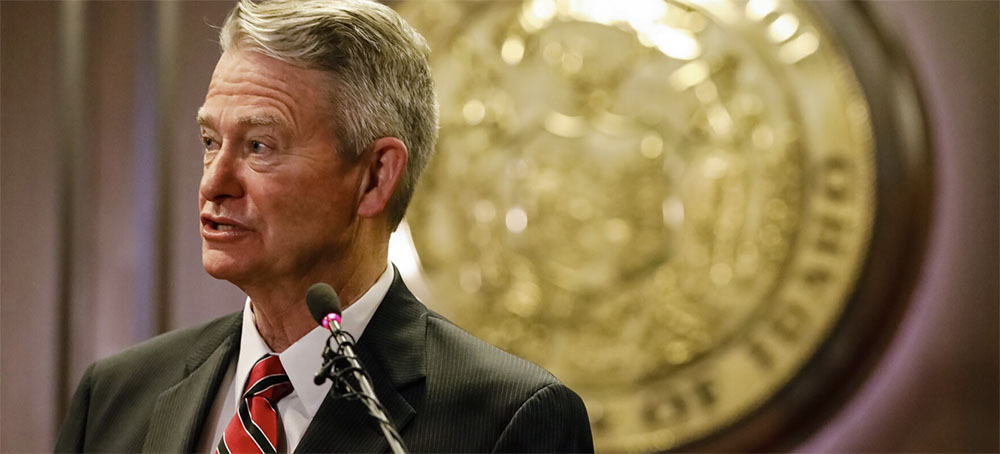 Gov. Brad Little (R), seen here in a file photo. On Tuesday, callers during a tele-town hall criticized his response to the coronavirus outbreak. (photo: Otto Kitsinger/AP)
Gov. Brad Little (R), seen here in a file photo. On Tuesday, callers during a tele-town hall criticized his response to the coronavirus outbreak. (photo: Otto Kitsinger/AP)
Outrage as state becomes first in US to pass ban modelled on Texas law that allows family members to sue abortion providers
The news comes with abortion rights under assault across the US – despite clear majority support for such rights. The conservative-dominated US supreme court is thought likely to overturn Roe v Wade, the 1973 ruling which established the right, later this year.
On Monday, Idaho house members passed the ban 51-14. No Democrats supported the legislation. The Senate has approved the bill and the Republican governor, Brad Little, is expected to sign it.
Abortion rights groups called on Little to use his veto.
Planned Parenthood called the bill a copycat of the Texas bill that became law last May and was controversially left in place by the supreme court.
“Idaho’s anti-abortion lawmakers ignored public opinion and rushed through this legislation, looking to capitalize on the US supreme court’s failure to block Texas’s ban,” Planned Parenthood said, adding that the bill’s proponents have been open about wanting Idaho to become “the next Texas”.
Jennifer M Allen, chief executive of Planned Parenthood Alliance Advocates, an Idaho nonprofit, said: “Little must do the right thing, listen to the medical community and veto this legislation before it forces Idaho patients to leave the state for critical, time-sensitive care or remain pregnant against their will.”
The Idaho bill would also allow family members to sue doctors who perform procedures after six weeks of pregnancy, before most people know they are pregnant. The bill provides a minimum reward of $20,000 plus legal fees within four years of the abortion for successful suits, compared to minimum $10,000 and legal costs under the Texas law.
Unlike the Texas law, the Idaho bill provides some exceptions in cases of rape or incest. While a rapist could not sue practitioners under Idaho’s new bill, family members could. Victims would have to file a police report and provide it to a doctor before they could get the procedure.
“This bill is not clever, it’s absurd,” said Democratic representative Lauren Necochea, adding that the rape and incest exemptions were “not meaningful”.
Last year, Little signed a “heartbeat” bill into law, but it included a “trigger provision” that stopped it being in effect until a federal court approved it, which has not happened.
Several Republican-run states have taken steps to restrict abortion rights. Among them, bills in Missouri would permit lawsuits against those who help someone cross state lines to get an abortion. Terminating non-viable pregnancies would be a criminal offense.
The Oklahoma senate recently passed six anti-abortion measures, including a copycat of the Texas ban. In February, the Arizona senate passed an abortion ban that would prohibit the procedure after 15 weeks, similar to the law passed in Mississippi, which is expected to lead the supreme court to overturn Roe v Wade.
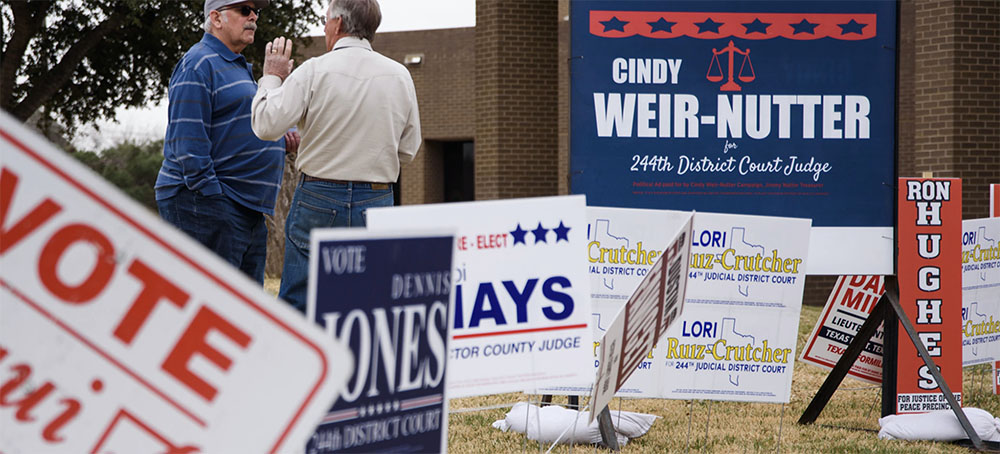 People at a polling location, on March 1, 2022, in Odessa, Texas. (photo: Eli Hartman/Odessa American/AP)
People at a polling location, on March 1, 2022, in Odessa, Texas. (photo: Eli Hartman/Odessa American/AP)
In Texas and at least 18 other states, restrictive new voting laws spell problems for upcoming runoffs, primaries, and the November general election.
More than 170 election workers in the county dropped out at the last minute, Tarrant County Democratic Party Chair Allison Campolo told The Intercept. The party did not know how many voters had been stopped from voting at the county’s Azle location that day. Across the state, Campolo said, both parties had trouble finding election workers on primary day. But Tarrant County experienced “an extreme number of last minute drop offs of available election judges.”
According to the Texas Tribune, more than a dozen polling locations in Tarrant County were closed for several hours due to staffing shortages among election judges. Texas is one of several states — also including Missouri, Maryland, and Colorado — to employ election judges to open and run poll locations, manage poll workers, and settle disputes. Other states call these officials “poll workers” or “election clerks,” but in Texas, where election judges have been used for decades, they’re partisan, and during primary elections, they are appointed by the chair of the county political party holding the primary. Numerous states had issues with recruiting poll workers at the start of the Covid-19 pandemic, and the number of jurisdictions that reported difficulty in finding enough poll workers increased by 5 percent between the 2016 and 2018 elections. But the number of sudden dropouts in Tarrant County this month was unusual, according to Campolo.
Many of the difficulties with recruiting and retaining election workers for this month’s primary stemmed from Texas’s new voting law, known as S.B. 1, Parker County Democratic Party Chair Kay Parr told The Intercept. At least 19 states passed restrictive voting measures in the year after the 2020 election, which Republican officials continue to falsely claim was stolen, but S.B. 1 is one of the nation’s most restrictive. Enacted by Republican Gov. Greg Abbott late last year, the law bans drive-thru voting, implements new ID requirements for mail voting, ends 24-hour voting, and expands the power of poll watchers. It also puts election officials at risk of committing a felony while carrying out their job duties.
S.B. 1 prohibits officials from “soliciting” or distributing mail ballot applications to people who haven’t requested them, meaning that answering questions about filling out a mail ballot or helping voters submit them could now be considered crimes — punishable by up to two years in jail and $10,000 in fines. In the eyes of the election judges, Parr said, the law threatens “legal liability for human error.”
Beyond that, with the elimination of mask mandates in most of the United States — including Texas — working the polls can be hazardous for the temporary staffers, many of whom are elderly or retired, amid the ongoing pandemic. They are often required to work for more than 14 hours on election days, a taxing shift for any worker. The new law only compounds the difficulty, adding considerable risk to a job that requires long hours, entails tedious duties, and pays minimum wage.
Azle sits on the county line between Tarrant and Parker counties, and both counties have their own rules for designating election officials from either party to assist voters. Parker didn’t have issues on primary day, Parr said, but several voters who weren’t able to vote in Tarrant came to the Azle poll site, about a five-minute drive away, on the Parker County side to try to cast their ballots.
Joe Grizzard, an alternate Democratic election judge at the Parker County polling location in Azle, said he had seen a posting prior to primary day saying that the Tarrant County elections office still needed poll workers. And he was worried about the impact the new law would have on election workers.
The county elections office “knew they had problems and they were trying to fix them but they didn’t fix them in time,” said Grizzard, who has been an election judge for five years. “I still have concerns for legal liability for telling someone something wrong or helping someone do something that I’m not authorized to do because of the change in the laws.”
Other aspects of the new Texas law made it harder to vote even before primary day. Last month, Texas election officials reported that thousands of mail ballots across the state were rejected at unprecedented rates because many people did not include the correct ID number on their envelope, as required by the new law. The number had to match the one they used on their voter registration, whether that was a driver’s license number or a partial Social Security number. Harris County, the most populous in the state, rejected 35 percent of ballots received by the mail ballot deadline, Reuters reported, compared to a rejection rate between 5 and 10 percent in recent years. Applications for mail ballots were also rejected at similar rates due to missing or incorrect ID numbers.
The Department of Justice sued Texas over S.B. 1 in November, arguing that the law would “disenfranchise some eligible mail voters based on paperwork errors or omissions immaterial to their qualifications to vote.” The case is expected to conclude before the general election, but the timeline is still in flux. In December, Harris County Elections Administrator Isabel Longoria and Cathy Morgan, a volunteer deputy registrar, filed a complaint in federal court against Texas Attorney General Ken Paxton. Both women — represented by the Harris County Attorney’s Office, outside counsel, and the Brennan Center — argued that the provision that criminalizes helping someone vote by mail criminalizes constitutionally protected speech.
Several weeks before the primary, an appeals court stayed an injunction against the portion of S.B. 1 that criminalizes solicitation of mail ballots. The matter is still pending in the 5th U.S. Circuit Court of Appeals.
Unless courts reinstate the injunction, the problems are likely to persist through the runoff and the general election in November, said Andrew Garber, a fellow with the Brennan Center’s voting rights and elections program. “We’re going to continue to see mail ballots rejected at high rates because it’s confusing,” he told The Intercept. “People are going to continue to be confused, fill out the wrong form, miss information on the form that could be resolved if the qualified election officials were able to print out public notices and preemptively help people do that.”
Texas’s law was designed “to create this exact disenfranchising outcome,” Garber said, and similar problems are likely to arise in at least 18 other states — including Georgia, Florida, Alabama, and Iowa — that joined Texas in passing restrictive new voting laws. “It makes the process of voting harder so that the end result is fewer people can vote.”
The shortage of poll workers has “certainly been made worse in Texas by some of the laws that have been passed,” according to Parr. “Our poll workers have fear of being sued now because of all of the national attention that voting got with the last election and the lies about the voter fraud. It’s harder for us to get poll workers. And that, combined with the lies and Covid, it’s made it much more difficult for us to get the experienced judges that we need for our poll sites for both parties.”
READ MORE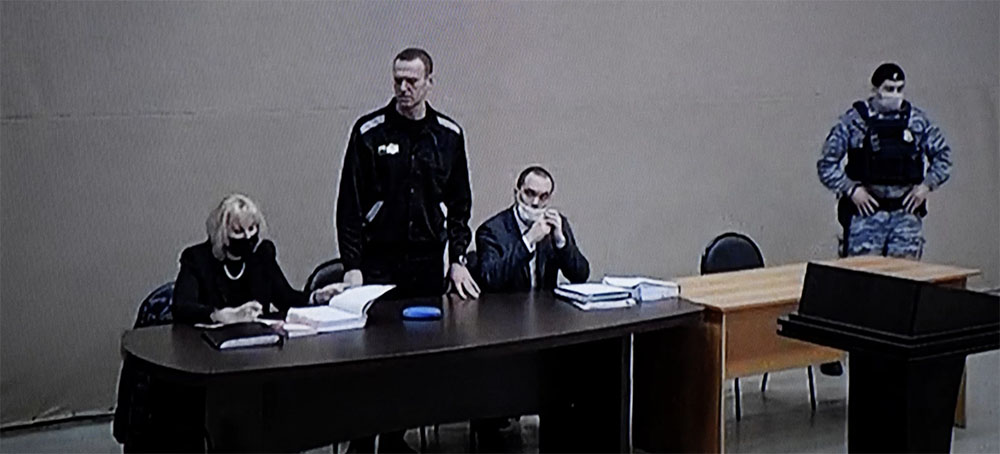 A photograph taken from a TV screen shows Kremlin critic Alexei Navalny during a court hearing at the penal colony N2 on the first day of his new trial on Feb. 15, 2022. (photo: Alexander Nemenov/AFP/Getty Images)
A photograph taken from a TV screen shows Kremlin critic Alexei Navalny during a court hearing at the penal colony N2 on the first day of his new trial on Feb. 15, 2022. (photo: Alexander Nemenov/AFP/Getty Images)
Navalny, who is serving a two-and-a-half-year prison sentence, is currently on trial for fraud and contempt of court, the outlet reported.
The prominent critic of Russian President Vladimir Putin recently spoke out against the country’s invasion of Ukraine, accusing the ruling party of using the war to distract Russian citizens from their problems at home.
“Thanks to Putin, hundreds of Ukrainians and Russian citizens may die now, and in the future, this number may reach tens of thousands,” Navalny said in a tweet. “Yes, he will not allow Ukraine to develop, he will drag it into the swamp, but Russia will pay the same price.”
Russian agents poisoned Navalny with a Soviet-era nerve agent in 2020, U.N. experts say, and he was arrested when he returned to the country in 2021 after receiving treatment in Germany.
 Sarah Bloom Raskin, nominee to be vice chairman for supervision and a member of the Federal Reserve Board of Governors, speaks during the Senate Banking, Housing and Urban Affairs Committee confirmation hearing on Feb. 3, 2022, in Washington, D.C. (photo: Bill Clark/Getty Images)
Sarah Bloom Raskin, nominee to be vice chairman for supervision and a member of the Federal Reserve Board of Governors, speaks during the Senate Banking, Housing and Urban Affairs Committee confirmation hearing on Feb. 3, 2022, in Washington, D.C. (photo: Bill Clark/Getty Images)
Our twice-a-week dive into the most pressing news related to our rapidly warming world.
Without the support of Manchin, who continues to hold powerful sway over the 50-50 split Senate, Raskin’s nomination has little chance of passing, dashing the hopes of environmentalists who believed she would help reign in a new era of climate-conscious regulation at what is arguably the world’s most powerful central bank.
Raskin has been unabashedly vocal about her belief that climate change poses an existential threat to the world’s financial systems. “If we ignore climate change, we in essence destroy the economy,” Raskin told lawmakers in March 2020, just as the coronavirus pandemic began to trigger lockdowns around the world.
That stance has drawn ire from Republicans, who say it’s not the Fed’s role to oversee climate issues and have worked for months to derail Raskin’s nomination. It also helped tank support from Manchin, the Democrats’ most conservative senator, who has made his fortune from coal and natural gas companies and has been a major obstacle to President Biden’s climate agenda.
“Her previous public statements have failed to satisfactorily address my concerns about the critical importance of financing an all-of-the-above energy policy to meet our nation’s critical energy needs,” Manchin said about Raskin in a statement Monday.
But a growing number of economists have taken positions similar to Raskin’s, saying that intensifying storms, wildfires, heat waves and droughts are already making it far more difficult for companies to conduct their business without major interruptions. Analysts say global warming also poses a transitional threat, meaning that as governments pass laws requiring the adoption of renewable energy, it could saddle residents with the costs of stranded assets, such as oil pipelines and natural gas power plants, that no longer serve a purpose in the coming decades.
A report released last year by Swiss Re, one of the world’s largest insurance providers, found that by 2050, the effects of climate change could shave as much as $23 trillion off global economic output when compared with growth levels without climate change. And in January, the financial firm Deloitte released a report that said the United States could lose $14.5 trillion over the next 50 years if it continues to delay transitioning its economy to net-zero emissions.
“Ms. Raskin’s outspokenness on climate is completely legitimate because it is an existential threat, and because climate-related shocks do pose threats to financial stability, and to the safety and soundness of financial firms and markets,” Richard Berner, an Obama-era director of the Treasury Department’s Office of Financial Research and co-director of New York University’s Volatility and Risk Institute, told E&E News.
At the Federal Reserve, Raskin would have had a host of tools at her disposal to help address the financial threats from climate change, including setting federal interest rates and designing monetary policy over how banks should treat future investments. Specifically, activists had hoped Raskin would use the Fed’s regulatory powers to stymie the flow of money into the fossil fuel industry and other businesses with significant carbon footprints.
Still, despite Manchin’s opposition, Democrats are moving forward with Raskin’s nomination, holding onto hope that they can convince some Republicans to cross the aisle. Senate Banking Committee Chairman Sherrod Brown (D-Ohio) said Monday that he would push forward a vote on Raskin. And Press Secretary Jen Psaki said the White House was continuing efforts “to garner bipartisan support” for Raskin.
Even without Raskin’s approval, Democrats still have some leverage to push forward climate-related financial regulation. This week, the Securities and Exchange Commission is expected to propose a new landmark rule that would require all publicly traded companies to disclose their greenhouse gas emissions and the climate risks their businesses face. It’s a move that would put the United States more in line with what other countries are already requiring, underscoring just how out of touch some U.S. lawmakers are when it comes to accepting the realities of the climate crisis.
Thanks for reading Today’s Climate, and I’ll be back in your inbox on Friday.
Today’s Indicator
70 percent
That’s how much Sweden is expected to increase its ability to generate electricity from wind power by 2024, officials announced Monday, marking a major boom in renewable energy development in the country.
Follow us on facebook and twitter!
PO Box 2043 / Citrus Heights, CA 95611

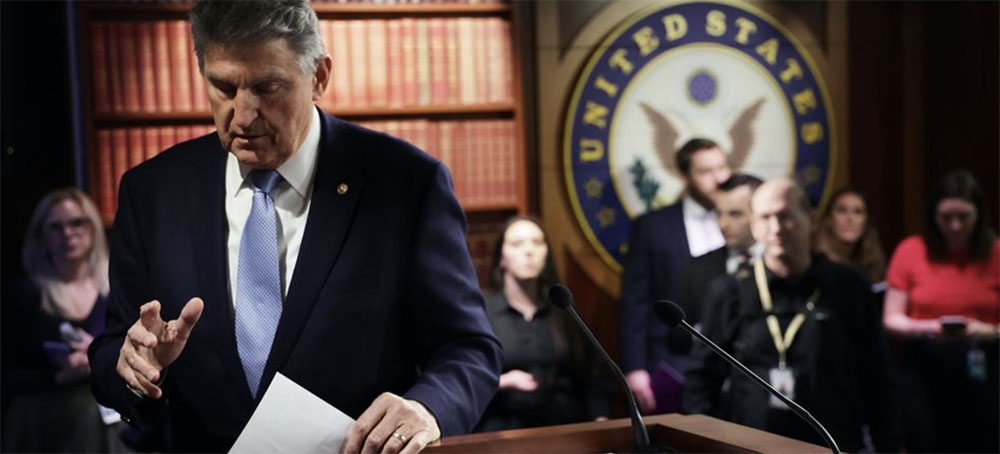

No comments:
Post a Comment
Note: Only a member of this blog may post a comment.